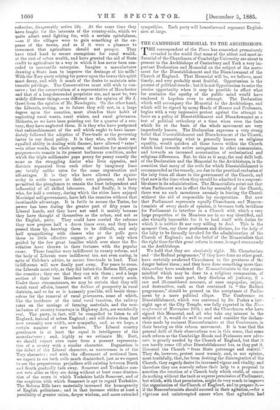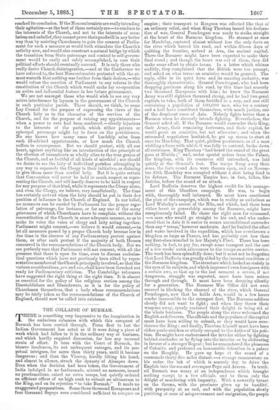THE CAMBRIDGE MEMORIAL TO THE ARCHBISHOPS.
THE correspondent of the Times has somewhat prematurely revealed to the world that some of the ablest and most in- fluential of the Churchmen of Cambridge University are about to present to the Archbishops of Canterbury and York a very im- portant Declaration and Memorial on the subject of the move- raent for the Disestablishment and the Disendowment of the Church of England. That Memorial will be, we believe, most timely, and very probably most fruitful. Opportunism is the poorest of political creeds ; but it is not Opportunism to seize the precise opportunity when it may be possible to effect what for centuries the apathy of the public mind would have rendered it hopeless even to attempt. The Declaration which will accompany the Memorial to the Archbishops, and which will be signed by many Heads of Houses and Professors, begins with a very impressive protest against the attempt to force on a policy of Disestablishment and Disendowment as a test of political orthodoxy at a time when even the facts which lie at the basis of the whole movement are very imperfectly known, The Declaration expresses a very strong belief that Disestablishment and Disendowment of the Church, far from promoting what is generally known as religious equality, would quicken all those forces within the *Church which tend towards active antagonism to other conannunions, and towards an increased accentuation of ecclesiastical and religious differences. But, be this as it may, the real drift bath of the Declaration and the Memorial to the Archbishops, is the assertion that many of the evils for which Disestablishment is recommended as the remedy, are due to the practical exclusion of the laity from all share in the government of the Church, and that now is the time when they should be admitted to a responsi- ble share in its administration. The Memorialists.point out that when Parliament was in effect the lay assembly of the Church, there was no such monstrous anomaly in leaving the Church without the aid of responsible lay co-operation. But now that Parliament represents equally Churchmen and 'Noncon- formists of every shade of opinion, it becomes both invidious for Parliament to interfere in a Church with which a very large proportion of its Members are in no way identified, and also virtually impossible for it to load itself with duties for which it is neither fit nor very willing to deal. This is the moment then, say these professors and divines, for the help of the laity to be formally invoked for the administration of the Church of England ; and the belief of the Memorialists that the right time for this great reform is come, is urged strenuously on the Archbishops.
We hold that they are absolutely right. Mr. Chamberlain and "the Radical programme," if they have done no other good, have certainly awakened Churchmen to the greatness of the danger before them ; and they have done something more than this,—they have awakened the Nonconformists to the s.erions mischief which may be done to a religious communion, of which, for the most part, they disclaim all jealousy, if a raw and ill-considered measure, at once unpopular, unjust, and destructive, such as that contained in "the Radical programme," should be pressed on the acceptance of Parlia-
ment by a mere political clique. The Conference on Disestablishment, which was convened by Dr. Parker a fort- night ago at the City Temple, was fully reported in the Non- conformist of November 26th; and the Churchmen who have signed this Memorial, and all who take any interest in the subject of it, would do well to read and consider the declara- tions made by eminent Nonconformists at that Conference, in their bearing on this reform movement. It is true that the general drift of their observations was in this sense, that some such reform as the Cambridge Heads and Professors now advo- cate. is greatly needed by the Church of England, but that it can hardly come till after Disestablishment has, as they put it, liberated the Church "from State patronage and control." They do, however, protest most warmly, and, in our opinion, most truthfully, that, far from desiring the disintegration of the Church, they eagerly desire its increased vigour and vitality, and therefore they can scarcely refuse their help to a proposal to sanction the creation of a Church body which could, of course do nothing without the tacit or express permission of Parliament, but which, with that permission, might do very much to improve the organisation of the Church of England, and to prepare it,— if the Nonconformists should succeed in their agitation,—f or a vigorous and unintempted career when that agitation had reached its conclusion. If the Nonconformists are really intending their agitation—as the best of them certainly are—to conduce to the interests of the Church, and not to the interests of secu- larism and unbelief, they cannot prove their goodwill in any better way than by assisting Churchmen to gain the consent of Parlia- ment for such a measure as would both stimulate the Church's activity now, and would also construct a natural bridge by which the transition from State patronage and control to self-govern- ment would be easily and safely accomplished, in case their political efforts should eventually succeed. It is only those who really desire Church disintegration,—and at the Conference we have referred to, the best Nonconformists protested with the ut- most warmth that nothing was further from their desires,—who would refuse the sanction of Parliament to any reform in the constitution of the Church which would make lay co-operation an active and influential feature in her future government.
We are not amongst those who would wish to see any very active interference by laymen in the government of the Church in each particular parish. There should, we think, be some Lay Council for the purpose of expressing the views of the Church laity as to the character of the services of the Church, and for the purpose of vetoing any appointments— when a power to veto had been conferred, —clearly injurious to the interests of the parish, which either private or episcopal patronage might try to force on the parishioners. No one knows how many cases of hardship arise from such ill-advised appointments, or how much the Church suffers in consequence. But we should protest, with all our heart, against anything like an introduction of the principle of the election of incumbents as wholly alien to the true genius of the Church, and as fruitful of all kinds of mischief ; nor should we desire to see the laity of individual parishes attempting in any way to supersede the Clergy in their initiative, or claiming to give them more than cordial help. But it is quite certain that Convocation will never be held in much respect as repre- senting the Church, and will hardly deserve to be held in respect for any purpose of that kind, while it represents the Clergy alone, and even the Clergy, we believe, very insufficiently. The time has certainly arrived when the laity should be put in their due position of influence in the Church of England. In our belief, no measures can be carried by Parliament for the proper regu- lation of patronage, for instance, or for any one of the many grievances of which Churchmen have to complain, without the reconstitution of the Church in some adequate manner, so as to
make its voice the voice of clergy and laity acting together. Parliament might consent,—we believe it would consent,—to
let all measures passed by a proper Church body become law in due time in the absence of any Parliamentary protest against them, or after such protest if the majority of both Houses
concurred in the recommendations of the Church body. But we are perfectly sure that Parliament will not consent, with all the pressure that there is upon its time, even to discuss ecclesias- tical questions which have not previously been sifted by repre- sentative members of the Church principally involved, so that the various considerations, pro and con, shall have been threshed out ready for Parliamentary criticism. The Cambridge reformers have suggested the right thing at the right time. It is almost as essential for the policy of the religious section among the Disestablishers and Disendowers, as it is for the policy of Churchmen themselves, that a body whose recommendations may be fairly taken as the recommendations of the Church of England, should now be called into existence.







































 Previous page
Previous page